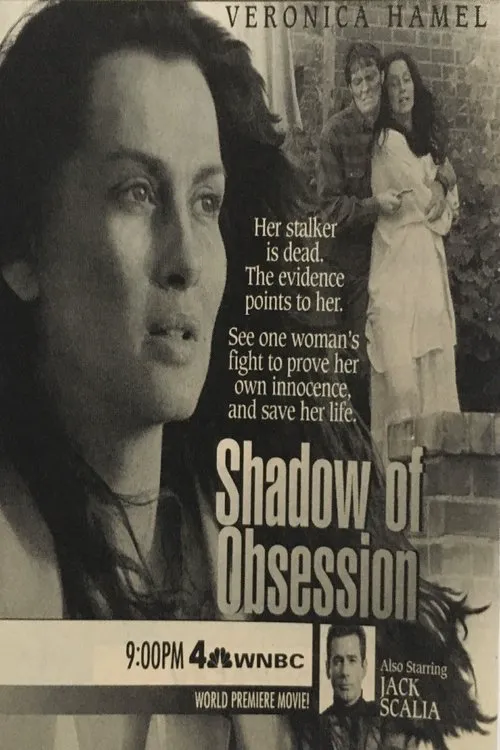Shadow of Obsession

Plot
Shadow of Obsession is a 1992 television film directed by Larry Elikann, starring Barbara Hershey and Brad Johnson. The movie unfolds with the introduction of Dr. Ellen Richards, a well-respected and accomplished professor of psychology at a small college, where students admire her for her expertise and dedication to teaching. At first, Ellen's professional life seems serene and fulfilling, as she shares her love of psychology with her students and watches them grow intellectually. However, her tranquil environment is disrupted by the arrival of a troubled young man named Scott Roberts, who is one of her new students. Scott is immediately drawn to Ellen, admiring her intellect and authority, but as the semester progresses, it becomes evident that he is struggling with intense emotional turmoil. Scott's behavior becomes increasingly erratic, as he begins to exhibit obsessive tendencies towards Ellen. He starts to send her anonymous notes and gifts, often expressing his deep fascination with her and her work. Ellen, taken aback by Scott's behavior, attempts to handle the situation with empathy and patience, believing that his actions are a cry for help. However, his stalking escalates as he begins to show up at Ellen's campus office, often interrupting her classes or showing up at her home, uninvited. As Scott's actions become more aggressive and disturbing, Ellen becomes frightened and starts to feel trapped. She tries to report his behavior to the college authorities, but they appear to be dismissive and unconcerned about her plight. Feeling helpless and scared, Ellen starts to limit her interactions with Scott, trying to find ways to avoid him without being obvious or antagonistic. However, before she can address the situation effectively, Scott disappears from campus. When the authorities are unable to find him, they start an investigation, and Ellen is initially relieved, thinking that she can finally put the ordeal behind her. However, the police soon discover that Scott's car has been found abandoned off-campus, and they become even more convinced that Ellen was involved in his disappearance. Despite her protests of innocence and the lack of a body, the police continue to build a case against her. With no evidence to contradict their claims, Ellen is arrested and charged with Scott's murder. The college community, which had initially sympathized with her plight, now turns against her, and Ellen is publicly ostracized. As the case against her builds, Ellen becomes increasingly desperate, believing that her reputation, career, and life are at risk. She starts to lose her grip on reality, doubting her own sanity and judgment. The trial becomes a dramatic and intense showdown between Ellen and her accusers, with the police, lawyers, and even her own colleagues questioning her credibility. Throughout the trial, hints of a deeper truth begin to emerge. It is revealed that Scott had a history of obsessive behavior, having previously stalked and intimidated other professors and students. His mental health was a concern to those who knew him, and it becomes apparent that Ellen's instincts about his behavior were correct all along. However, just when it seems like the truth will finally come to light, the case against Ellen suffers a devastating setback: a key witness, a female student who had also been stalked by Scott, is found dead in a suspicious incident off-campus. The police immediately point the finger at Ellen, believing that she is responsible for her own "guilty" behavior and the disappearance of both Scott and the student. As the trial comes to a close, Ellen faces a harsh and unforgiving verdict: guilty of Scott's murder, based largely on circumstantial evidence and the twisted web of deceit spun by the prosecution. The movie ends on a somber note, with Ellen serving her sentence in prison, her reputation forever tarnished by the shadow of obsession cast by Scott's twisted obsession. The movie raises important questions about stalking, the treatment of victims, and the justice system's handling of complex cases involving mental illness and obsessive behavior. While it is a cautionary tale about the dangers of obsession, Shadow of Obsession also serves as a powerful tribute to the resilience and courage of its protagonist, Dr. Ellen Richards, who is victimized by Scott's actions and then further maligned by those who refuse to listen and believe.
Reviews
Recommendations


